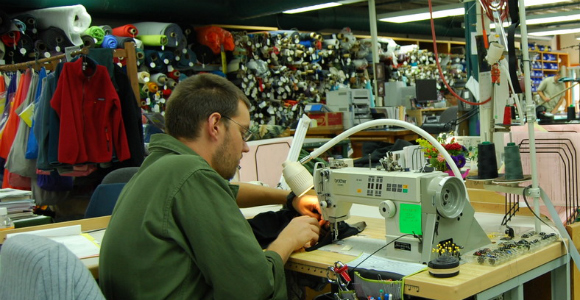
Patagonia, Inc. was the first company to receive California’s “benefit corporation” designation in 2012. (Photo Credit: Nicolás Boullosa/Flickr)
There’s an emerging class of entrepreneurs who take the leap into business not just to make money but also to advance social and environmental causes. These businesses are called for-benefit organizations and are part of what’s referred to as the “fourth sector.”
Famous examples are TOMS Shoes and Grameen Bank, an institution that loans money to women-owned small businesses around the world.
Since these companies don’t fit in the same category as a for-profit or nonprofit, government policies haven’t had time to catch up. That puzzle is one of the reasons the Summit’s Capital Action Team is partnering with the White House’s Investing in Manufacturing Communities Partnership to host a summit called “Growing the Impact Economy in California” on Friday, November 14 in Los Angeles.
“California is the home of innovation, and one of the most exciting areas where innovation is needed and happening here is in impact investing,” said Lenny Mendonca, co-chair of CA Fwd and featured speaker. “Government alone can’t solve all our pressing issues, but entrepreneurs are working with government, business and the social sector to find new cross-sectoral ways, new organizational forms and new financial structures to solve problems.”
You can look over the agenda and speaker list for the event here. For more info and to request an invitation, send an email to info@caeconomy.org.
To make sure these companies in this special sector can do well while doing some good, advocates say there needs to be more coherent approaches to developing the for-benefit sector in California and nationwide. Economic development policies and programs are mostly designed for growing for-profit companies.
“Historically, policy and market structures have been designed to support organizations that are for-profit or non-profit,” said Heerad Sabeti, a serial social entrepreneur and a co-founder and trustee of the Fourth Sector Network. “For-benefits are a hybrid of these forms, so they don’t fit either mold. They require capital, talent, metrics, technical assistance, and policies that are tailored to their unique structure.”
Those needs include more straightforward tax and investment policies that align better with those structures. Using social impact economy events like the one this week in L.A., advocates and operators of for-benefit organizations are hoping to help policymakers understand barriers facing these kinds of companies so they can grow and do more for the causes they’ve adopted.
“Take access to capital, for example,” said Sabeti. “If a for-benefit goes to a typical for-profit investor whose goal is maximizing returns, they will often have to compromise their mission in favor of profits. If they try to seek philanthropic grants, they can be rejected because they come across as a revenue-generating businesses, not a typical charity.”
The Impact Economy event will kick off with a discussion on how to grow the ecosystem that supports the fourth sector and continue with an innovations panel, moderated by Matthew Bishop, globalization editor for The Economist magazine.
The primary goals of fourth sector companies, besides growing jobs and generating profit, are pretty varied and include:
- revitalization of economically distressed regions;
- economic participation of traditionally disadvantaged or underrepresented populations;
- poverty alleviation and middle-class expansion;
- greater environmental sustainability;
- and reduced costs and burdens on government.
The California Economic Summit made the jump into the discussion about how for-benefit companies can create jobs in the state by hosting a meeting at the 2013 Summit with the California Governor’s Office of Business and Economic Development (GO-Biz), California Forward, and the White House’s Investing in Manufacturing Communities Partnership.
Related > VIDEO: Making green to do some good: For-benefit companies
At the 2013 California Economic Summit in Los Angeles, federal officials met with attendees to talk about this growing sector that integrates social good with running a business. California Forward’s Cheryl Getuiza spoke with Matt Bogoshian of the US EPA to find out more.
Related > VIDEO: A space for Southern California entrepreneurs doing good while doing well
Hub LA, a new membership community, stands out amongst other types of co-working spaces because it was founded on nurturing companies who prioritize the triple bottom line (prosperous economy, a sustainable environment and community equity).

